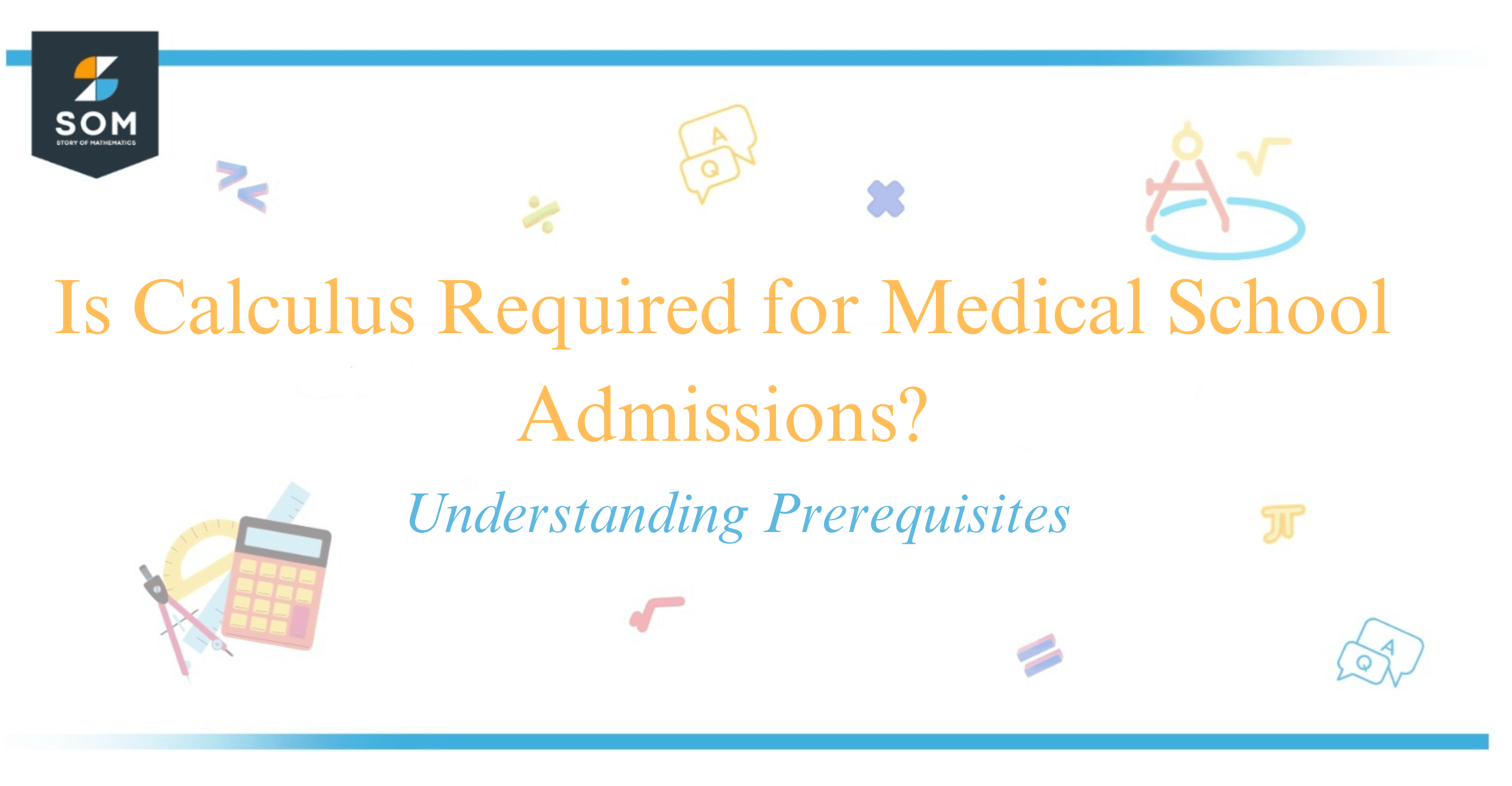JUMP TO TOPIC

No, calculus is not universally required as a prerequisite for medical school admission. Many medical schools instead suggest a strong foundation in mathematics and recommend courses in calculus and statistics because they provide a solid base for the data analysis and research methods that are integral in the medical field.
Additionally, some advanced courses in medical school, such as biostatistics or pharmacology, may indirectly draw on the analytical skills that are developed through studying calculus.

I’ve discovered that while calculus may not be a mandatory requirement, several prestigious medical schools do list it as a recommended or strongly suggested course. This suggests a nuanced view of calculus in the medical school prerequisites landscape, reflecting an appreciation for the problem-solving and analytical competencies it cultivates.
Role of Math in Medical School Prerequisites
In my journey to medical school, I’ve recognized that a strong foundation in math is quite critical. Let me explain.
Medical school prerequisites in the United States typically involve a hefty science load. We’re talking about courses like biology, physics, and chemistry that often incorporate mathematical concepts. But what about math courses themselves?
The American Association of Medical Colleges (AAMC) and the individual medical school’s Committee on Admission offer guidelines on prerequisite courses. They emphasize the importance of math in medical education, typically requiring at least two semesters of college-level math. The courses accepted can include college math, calculus, and/or statistics. The idea is that these courses build analytical skills that will be vital in medical practice and research.
| Math Prerequisite | Other Acceptable Math Courses |
|---|---|
| College Mathematics | Statistics |
| Calculus | Applied Math Courses |
| Statistics | College Algebra |
As a prospective medical student, I’ve learned that while calculus might not be mandatory in all schools, it’s welcomed by many. Instead, statistics is gaining popularity for its direct application in the field – think biostatistics or data analysis for clinical trials.
Speaking of GPA – which we all know is a cornerstone of medical school admission – excelling in math can certainly bolster your academic record. Most medical schools ask for a competitive score, but they also look for a well-rounded education, which includes math.
Now, not all medical schools have the same math requirements. Some might accept AP math credits – as long as they appear on your college transcript. So, for a major stepping stone like medical school, ensuring I meet these prerequisites is key to a successful application.
Mathematics in the Premed Curriculum
In my journey towards medical school, I’ve discovered that while the exact mathematics requirements can vary across different institutions, there is a common thread in the premed curriculum.
Mathematics forms an integral part of the scientific foundation required for a future in medicine. Here’s my breakdown based on current standards and the recent search results I came across:
Core Mathematics Courses
Statistics & Biostatistics: Most medical schools expect applicants to have completed at least one course in statistics or biostatistics. This is crucial since research data interpretation is a significant part of medical studies.
Calculus: Calculus is not universally required, but some medical schools do list it as a prerequisite. It’s wise to check the specific requirements of each school you’re interested in.
Interdisciplinary Relevance
Biological sciences, especially genetics, often utilize statistical methods for analysis. Similarly, physics and chemistry, which are common premed requisites, occasionally require mathematical applications that would be familiar to those well-versed in calculus and more general college-level mathematics.
Application in Medical Fields
A good grasp of mathematics supports my understanding of dosage calculations, physiological modeling, and laboratory work. Moreover, the analytical skills I gain are transferable to diagnosing and solving complex medical problems.
Here’s a quick reference table I compiled that outlines common mathematics requirements for premed students:
| Subject | Typically Required | Notes |
|---|---|---|
| Statistics | Yes | Crucial for research and data analysis. |
| Biostatistics | Sometimes | Helps with understanding biological data. |
| Calculus | No | Required by some schools, not all. |
| College Math | Yes | General courses may suffice where calculus does not. |
In summary, while calculus might not be mandatory for every medical school, a solid foundation in mathematics is essential for success both as a premed student and as a future medical professional. My advice: focus on statistics and check individual school requirements for calculus.
Exceptional Courses and Varied Requirements by School
When exploring the prerequisites for medical schools, I find that calculus is not universally required. However, specific institutions may have unique expectations. For example:
- Harvard University prefers applicants to complete coursework that reflects a broad education, which sometimes includes calculus.
- Duke University and Johns Hopkins University expect proficiency in math, with some candidates completing calculus to demonstrate this.
- Brown University and Dartmouth College take a holistic approach, considering the overall quality and breadth of the student’s educational background.
These nuances extend beyond the U.S:
| Country | Typical Math Requirements |
|---|---|
| UK | A-Levels in Math may be preferred |
| Canada | Varies by province and school |
Statistics courses often supplement or replace the need for calculus:
- Yeshiva University suggests that biostatistics or statistics can be particularly relevant to medical studies.
The American Association of Medical Colleges (AAMC) provides guidance, suggesting that essential mathematical analysis skills are critical, whether acquired through calculus or otherwise.
Here’s a snapshot of what some top universities recommend:
| University | Math Requirement |
|---|---|
| Stanford University | One year of college math |
| Johns Hopkins University | Calculus or strong math background |
In essence, while calculus may not be a formal requirement across all schools, competencies in math are crucial, and taking calculus could enhance a medical school application.
Competencies Beyond Academics
While academic performance, demonstrated by GPA and grades in premedical course requirements, is crucial for medical school admissions, there’s an increasing emphasis on holistic evaluation. My competencies, for instance, shouldn’t be limited to how well I navigate courses like biology or organic chemistry. Instead, medical schools look for a broader set of skills, which I’ve found aligns with the MCAT’s inclusion of psychology, sociology, and behavioral sciences.
Primary Non-academic Competencies:
- Service & Compassion: Medical schools seek students who have shown a genuine commitment to service and possess empathy—a radiologists don’t just read films; they’re part of a compassionate patient care team.
- Writing Skills: Effective communication, including the ability to clearly articulate complex information, is essential. My essays and applications must reflect strong writing proficiency.
- Professional Skills: Attributes like resilience and teamwork are often evaluated through tools like the AAMC’s PREview exam.
I’ve found that my academic rigor and prerequisite coursework only partially define my readiness for medical school. The contemporary medical curriculum demands that I have a well-rounded set of preprofessional competencies:
| Core Competency | Description |
|---|---|
| Critical Thinking | Analysing and synthesising information |
| Interpersonal Skills | Working effectively in teams |
| Intrapersonal Skills | Demonstrating resilience and adaptability |
Furthermore, schools may view AP credit differently, but all expect a certain level of competency, indicating that it’s not just about the courses I’ve taken but how I’ve cultivated my skills through them. It’s clear to me that med students are expected to be not just scholars, but well-rounded individuals equipped to handle the rigors of a medical career.
Conclusion
In examining the admission requirements for various medical schools, I have found that a significant number of institutions do not mandate calculus for entry. Indeed, the landscape of premedical education shows a trend where only about 20% of medical schools in the United States require calculus as part of their prerequisites.
While the subject of calculus may not be a staple requirement across all medical schools, I suggest a proactive approach. Prospective medical students should research specific schools of interest as criteria can change.
Having a solid foundation in math, especially through courses like statistics, often proves beneficial for the medical curriculum and the Medical College Admission Test (MCAT).
Prospective medical school students should consider enrolling in calculus to strengthen their overall application, even if it’s not a stringent requirement. This approach demonstrates readiness for the analytical thinking that a medical education demands.
By preparing for both essential requirements and preferred qualifications, candidates can ensure they present as competitive and well-rounded applicants.
